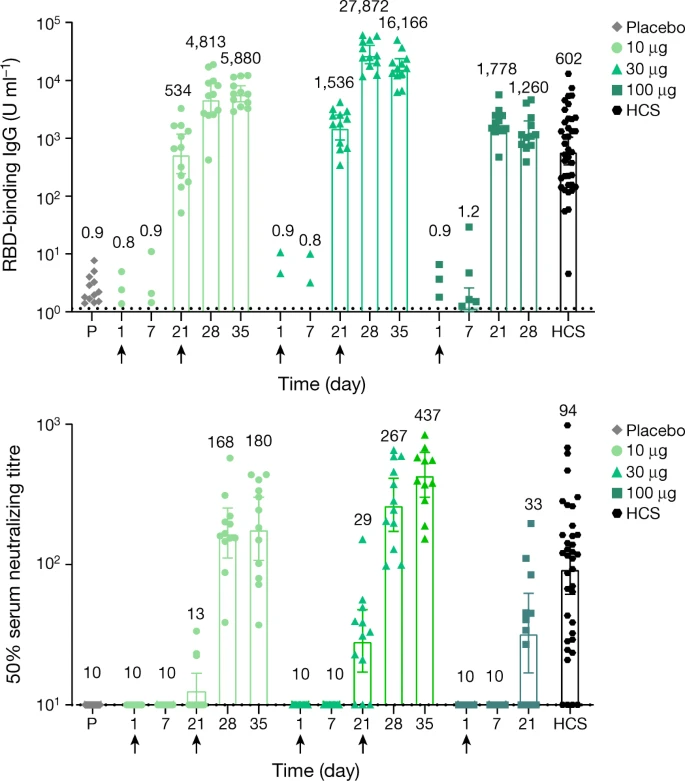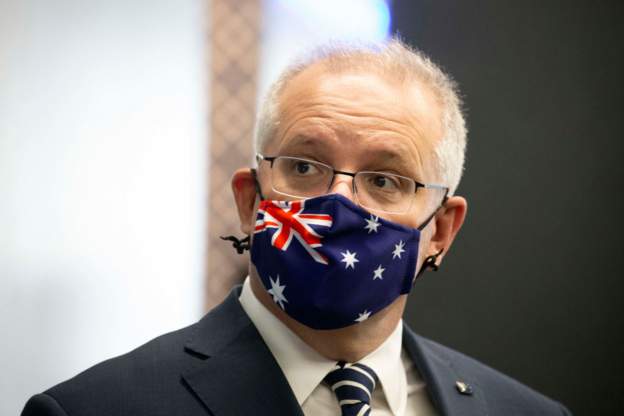balaks
Full Member
That sounds horribly like the vaccinator (or the receptionist or whoever) has covid and something went badly wrong on the PPE front.
Yeah it could be that - as you can imagine there will be an inquest over it - rightly so.
That sounds horribly like the vaccinator (or the receptionist or whoever) has covid and something went badly wrong on the PPE front.
Unfortunately in the first week after the first dose of the vaccine, the immune response is very weak. You wouldn't expect it to limit the effects of the virus if you get it during that time period, never mind stop you from getting infected.Getting the jab this morning.
I have heard on the grapevine also though that in a local health Trust here there is due to be an emergency meeting this week because several patients in a local facility tested positive for covid about 10 days after receiving the vaccine. Could be nothing because my understanding is that the first jab wont necessarily stop you getting the virus, but should at least mean you get a milder disease.
RBD-binding IgG concentrations and SARS-CoV-2-neutralizing titres were assessed at baseline, at 7 and 21 days after the first dose, at 7 days (day 28) and 14 days (day 35) after the second dose of BNT162b1 By 21 days after the first dose (for all three dose levels), geometric mean concentrations (GMCs) of RBD-binding IgG ranged from 534 to 1,778 U ml−1 (Fig. 4a). In comparison, a panel of 38 SARS-CoV-2 infection and/or COVID-19 convalescent sera drawn at least 14 days after a PCR-confirmed diagnosis from patients with COVID-19 (18–83 years of age) had an RBD-binding IgG GMC of 602 U ml−1.
For all doses, small increases in SARS-CoV-2-neutralizing geometric mean titres (GMTs) were observed 21 days after the first dose (Fig. 4b). Substantially greater serum neutralizing GMTs were achieved 7 days after the second 10-μg and 30-μg dose, reaching 168–267. Neutralizing GMTs further increased by 14 days after the second dose to 180 (10-μg dose level) and 437 (30-μg dose level), compared to 94 for the panel of human convalescent sera. The kinetics and durability of the neutralizing titres are being monitored.

France has vaccinated just 516 people as of this weekend. Despite having 500,000 doses. Apparently 6 out of 10 surveyed intend refusing a vaccine when offered. Shocking stuff. Any theories as to why they’re such an outlier?
France has vaccinated just 516 people as of this weekend. Despite having 500,000 doses. Apparently 6 out of 10 surveyed intend refusing a vaccine when offered. Shocking stuff. Any theories as to why they’re such an outlier?
It was noted before the pandemic that France has one of the lowest confidence levels in vaccination programmes in Western Europe. I'm pretty sure I've seen some data on it, I'll try to dig it out later this afternoon.
It was noted before the pandemic that France has one of the lowest confidence levels in vaccination programmes in Western Europe. I'm pretty sure I've seen some data on it, I'll try to dig it out later this afternoon.
I’m mainly curious as to why they’re so sceptical? Maybe need to check with someone French?
@JPRouve

Load of bollocks from ScoMo. Aus weren’t first in the vaccine queue so trying to spin it as caution.Australian PM vows not to 'cut corners... like UK'

Australian Prime Minister Scott Morrison has vowed not to take "unnecessary risks" in rolling out its vaccination programme - and suggested that the UK has.
The Australian government is aiming to give the first vaccine doses by the end of March, despite once boasting Australia would be "at the front of the queue" for any vaccine.
But Morrison is defending the timetable, saying the world's hardest-hit countries, such as the UK, are rushing the process.
"Australia is not in an emergency situation like the United Kingdom. So we don't have to cut corners. We don't have to take unnecessary risks," he told local radio 3AW.
The UK is "in the very early phases" of the vaccine rollout and "they've had quite a few problems, and they're doing it on an emergency basis", he added.
He went on to incorrectly allege that the UK is not testing batches of doses before they are distributed.
Before a batch can be used by the NHS, it has to be checked and certified by the Medicines and Healthcare Products regulatory Agency. It can be several weeks to make sure it meets quality standards before the vaccine can be given to the NHS to put in people's arms.
Australia has been largely successful in eliminating community transmission but is currently battling to contain small clusters of the disease in Sydney and Melbourne.
Load of bollocks from ScoMo. Aus weren’t first in the vaccine queue so trying to spin it as caution.
I’m mainly curious as to why they’re so sceptical? Maybe need to check with someone French? @JPRouve
A significant part of the population doesn't trust political elites for various reasons such as:
- French Gvt inconsistent from A to Z (for example, saying PPE masks were useless before making it mandatory outside, etc.)
- Historical heritage: revolution, Kings decapitated, protests, dissertation at schools, etc.
- Scandals in the healthcare sector: blood transfusion scandals, etc,
- Mediterranean country: colonisation heritage and geography
The consequences are the:
- Mainstream media more critical to attract audience: generally speaking, a political debate in the UK is relatively consensual compared to the equivalent in France which is much more confrontational, ironical and aggressive.
- Conspiracy theories/alternative thinking are more popular
- Police and fines are needed to enforce the law and lockdown i.e. in other Mediterranean countries like Morocco, the army is required in the streets...
- French Gvt is blamed whatever they do by opposition parties
- Political U-turns are badly perceived
- High abstention from voting
Welcome to France
My parents live down in the Var now, and don't understand why everyone is so reluctant. If they could, they'd go and get jabbed tomorrow. They tell me the process is also fairly long-winded - pre-vaccination counselling, and a detailed consent form, before you get jabbed (totally open to the idea that this isn't fully correct - I think my dad discovered YouTube last year).
My parents live down in the Var now, and don't understand why everyone is so reluctant. If they could, they'd go and get jabbed tomorrow. They tell me the process is also fairly long-winded - pre-vaccination counselling, and a detailed consent form, before you get jabbed (totally open to the idea that this isn't fully correct - I think my dad discovered YouTube last year).
Great progress by them, unfortunately soured by the fact they've excluded Palestinians from receiving the jabs, even opting to give them to the illegal settlers:Israel has apparently vaccinated 1.8 million, which is brilliant progress even compared to western countries.
Great progress by them, unfortunately soured by the fact they've excluded Palestinians from receiving the jabs, even opting to give them to the illegal settlers:
https://www.theguardian.com/world/2...-covid-vaccine-rollout-as-jabs-go-to-settlers
Great progress by them, unfortunately soured by the fact they've excluded Palestinians from receiving the jabs, even opting to give them to the illegal settlers:
https://www.theguardian.com/world/2...-covid-vaccine-rollout-as-jabs-go-to-settlers
Load of bollocks from ScoMo. Aus weren’t first in the vaccine queue so trying to spin it as caution.
I get the Uk approach to do the most at risk in rapid time with one dose, then slowly open things up whist doing categories further down the list, it seems like a good plan.
This is around 13 million people or so,, but I wonder what the plan is for those who refuse it, which at 80 % uptake could be just short of 3 million people, it's a lot of people in the most at risk categories to be left exposed to infection, whilst a large part of the population are still spreading it.
Also are they asking people before appointments are made if they're taking it or not, or just hoping they turn up?
So apparently 20k people in England have had their second dose already. Are the people rolling out the Pfizer vaccines just ignoring the 12 week thing?
So apparently 20k people in England have had their second dose already. Are the people rolling out the Pfizer vaccines just ignoring the 12 week thing?
I think this is good and right provided AZ can keep the wider vaccine rollout going, I just wonder if there's been any communication from above that this should happen with Pfizer stock, or if clinical staff are just making their own call.My Mum, who works for the NHS, had her first dose Tuesday and was told the second would be in three weeks. She works with and assesses elderly mentally ill (EMI) patients so maybe it’s more a case of protecting them rather than her.
Great progress by them, unfortunately soured by the fact they've excluded Palestinians from receiving the jabs, even opting to give them to the illegal settlers:
https://www.theguardian.com/world/2...-covid-vaccine-rollout-as-jabs-go-to-settlers
The Palestinian Authority is the sole civil authority for around 97% of the Palestinian population of the West Bank, and as the article mentions, they haven’t requested help or coordination from Israel. And according to this, they may not have the infrastructure to store the Pfizer vaccine anyway.
I’d be interested to know if Israel is denying the vaccine to the 3% under Israel civil authority?
Israel’s prime minister Benjamin Netanyahu said supply agreements with Pfizer meant that all Israelis over the age of 16 would be able to be vaccinated by the end of March, or perhaps even earlier.
Israeli officials have said they hoped Israel could emerge from the pandemic as early as February if the vaccination programme maintains its speed.
However, turnout for vaccines has been low among Arabs, who make up 21% of Israel’s population, and Jerusalem Palestinians.
Israel launched its vaccination drive on December 19th with supplies from Pfizer Inc’s. The Health Ministry said on Thursday that 17.5% of the population - and 70% of citizens aged 60 or older - had received their first shots.
I don't think giving the vaccine will be the bottleneck anywhere in about 2-3 weeks. It will be the lack of doses.Doesn’t look like it, no.
From the Grauniad:
The speed at which they’re doing this is incredible. I’d love to know how it’s being achieved. Is it just a case of throwing a shit-load of money at the problem? If so, surely the cost-benefit means the same approach would work elsewhere?
The priority distribution age should in my opinion centre around which age demographic are dominanting the ICU wards, because ICU capacity is ultimately going to dictate how long restrictions are here for.I don't think giving the vaccine will be the bottleneck anywhere in about 2-3 weeks. It will be the lack of doses.
In an ideal world no country would be getting doses to vaccinate people under 50, before people over 60 are vaccinated everywhere, imo.
I don't think giving the vaccine will be the bottleneck anywhere in about 2-3 weeks. It will be the lack of doses.
In an ideal world no country would be getting doses to vaccinate people under 50, before people over 60 are vaccinated everywhere, imo.
